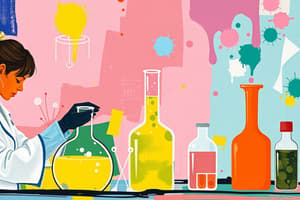Podcast
Questions and Answers
What is the correct method for transferring liquids using a pipet?
What is the correct method for transferring liquids using a pipet?
- Fill the pipet directly from the reagent bottle.
- Use any available suction method.
- Use mouth suction to fill the pipet.
- Use a rubber bulb or pipet pump. (correct)
When diluting strong acids, which statement describes the proper procedure?
When diluting strong acids, which statement describes the proper procedure?
- Add water to acid and mix vigorously.
- Add both water and acid simultaneously.
- Add acid to water and stir carefully. (correct)
- Mix acid and water equally in a closed container.
What should be done if a piece of glassware gets stuck in a stopper?
What should be done if a piece of glassware gets stuck in a stopper?
- Ask an instructor for assistance. (correct)
- Use a lubricant before attempting to remove it.
- Attempt to pull it out with force.
- Leave it in the stopper until ready to use.
How should flammable liquids be handled in the laboratory?
How should flammable liquids be handled in the laboratory?
Which of the following is important to do before using glassware in the laboratory?
Which of the following is important to do before using glassware in the laboratory?
What should be done if you do not understand how to use a piece of equipment?
What should be done if you do not understand how to use a piece of equipment?
What is a recommended precaution when using a gas burner?
What is a recommended precaution when using a gas burner?
What precaution should be taken regarding heated metals and glass?
What precaution should be taken regarding heated metals and glass?
When dealing with a test tube being heated, what should you avoid doing?
When dealing with a test tube being heated, what should you avoid doing?
How can you check if an object is hot before grasping it?
How can you check if an object is hot before grasping it?
Flashcards are hidden until you start studying
Study Notes
Laboratory Safety and Handling Chemicals
- Use rubber bulbs or pipet pumps for filling pipets; never use mouth suction.
- Transfer reagents cautiously by holding containers away from the body.
- Handle acids with extreme care; always add acid to water to dilute, particularly for sulfuric acid, and take precautions against heat generation.
- Use a pan to contain spills when working with flammable liquids; avoid dispensing near open flames or heat sources.
- Never remove chemicals or materials from the laboratory area.
Safe Transport and Handling of Chemicals
- Secure acids and hazardous chemicals when transporting; walk carefully to avoid spills.
- Carry long glass tubing vertically to reduce breakage risk.
- Use a brush and dustpan for cleaning broken glass; dispose of it in designated containers.
Glassware Handling Precautions
- Lubricate glassware before inserting into stoppers; wear protective gear when handling glass.
- Report any "frozen" glassware in stoppers to the instructor for removal help.
- Fill wash bottles with distilled water only for specific tasks like rinsing.
Electrical Safety
- Always grip the plug when removing electrical devices from sockets; keep hands dry to avoid electrical hazards.
- Inspect glassware for chips or cracks prior to use; never use dirty or damaged glassware.
- Report damaged electrical equipment immediately, including frayed cords or loose connections.
Equipment Use and Heating Substances
- Ask for help when unsure about equipment use.
- Prevent hot glassware from shattering by avoiding immersion in cold water.
- Exercise caution with gas burners; keep hair and clothing away from flames and do not place substances in the flame unless instructed.
- Never leave a lit burner or heated items unattended; turn off equipment when not in use.
Testing and Handling Hot Items
- Follow proper techniques for heating and boiling liquids in test tubes; do not point open test tubes at yourself or others.
- Allow heated metals and glass to cool before handling; utilize tongs or heat-protective gloves.
- Do not look directly into heated containers or place hot apparatus on desks without an insulating pad.
- Determine if glass is hot by cautiously bringing the back of your hand close to it before touching.
Studying That Suits You
Use AI to generate personalized quizzes and flashcards to suit your learning preferences.




